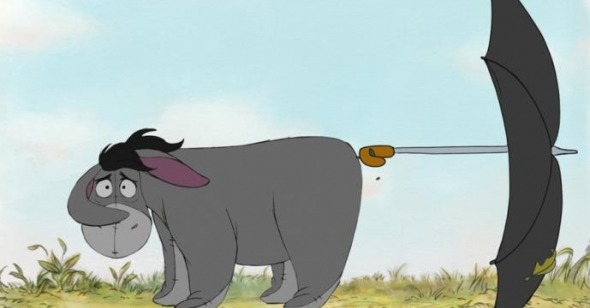Monday Hangover
Winnie the Pooh
By Fernando F. Croce and Adam Nayman
Much of the pleasure of Disney’s new Winnie the Pooh movie lies in seeing so many old friends again—not just the denizens of Hundred Acre Wood but also such nearly vanished animation staples as pencil-drawn lines and watercolor backgrounds. As always when dealing with nostalgia, there’s the risk of unfairly dismissing high-tech innovations in favor of idealized, supposedly simpler pasts that exist solely in our minds—a dismissal that becomes less reasonable once we consider the spatial possibilities that have opened up onscreen as a result of digital animation and 3D. Still, I wouldn’t hesitate to trade all the dimensional novelties of the latest Pixar picture for the single moment here when the screen (which is employed throughout the movie as a succession of storybook pages gently narrated by John Cleese) is tilted this way and that to rouse the eponymous ursine protagonist out of bed, a bit of play with the frame that’s right out of The Navigator.
Am I crazy to bring up Buster Keaton in connection to a slender, barely hour-long children’s fable enacted by talking stuffed animals? I’ll go even crazier: The way Pooh (voiced by Jim Cummings) literally stumbles into one of the book’s paragraphs, scattering calligraphic symbols all over the place, has to be the most inventive use of onscreen text since Godard’s La Chinoise. Okay, enough. What I’m saying is that Winnie the Pooh abounds in such inventive meta-gags while staying true to the anecdotal modesty and introspective serenity of A.A. Milne’s original stories. And though there’s a pair of searches afoot—the gang’s for Eeyore’s missing tail, Pooh’s for a pot of honey to pacify his growling tummy—the picture remains gratifyingly attuned to character over plot. Pooh, with his sighing tranquility; Tigger, (also Cummings) with his pouncing optimism; Eeyore (Bud Luckley), the gloomiest of existentialists; Owl (Craig Ferguson), a windbag narcissist; querulous Rabbit (Tom Kenny); Piglet (Travis Oates) and his panic attacks; Kanga (Kristen Anderson-Lopez) and Roo (Wyatt Dean Hall), tied together by some invisible umbilical cord—distinct personalities, playthings for Christopher Robin (Jack Boulter) and enduring facets of childhood, rather than fuzzy toy designs whipped up by eager-beaver animators seemingly paid by the pop-culture reference.
Stephen J. Anderson, who codirected with Don Hall, was also behind 2007’s Meet the Robinsons, which was guilty of precisely the kind of top-heavy restlessness scrupulously avoided here. While that film had Disney straining to keep up with rival studios, Winnie the Pooh, like The Princess and the Frog and Tangled, finds the company consciously trying to rediscover the qualities that made it stand out in the first place. In the new film’s loving visual craft and wry tenderness, they’ve succeeded in rediscovering at least a few of those qualities. —FC
Fernando, I can’t top your invocations of Buster Keaton and La Chinoise. But if I have to allude to a classic of world cinema in order to indicate that I thought this new version of Winnie the Pooh is pretty a’ight I’d mention Au hasard Balthazar: the other movie about a sad donkey that just can’t win.
In all seriousness, though, I agree with pretty much everything you’ve said about Anderson and Hall’s attempt to enshrine old-school values, not only with regard to the (lovely) animation but also the emphasis on character. I’d only add that the extended episode about the “Backsun”—the mysterious monster described by Owl that’s allegedly menacing the Hundred Acre Wood—is particularly clever in how it ties the gang’s paranoia to Christopher Robin’s being briefly away; if Winnie et. al are on some level constructs of their human playmate’s imagination, it’s telling to see how they operate in his absence. This dynamic might have been developed further. (The opening credits, made up of live-action shots of affectionately strewn stuffed animals, hinted in this direction, but that’s not a flaw—just a forest path untaken).
I think you’re right to describe Milne’s books as founts of “anecdotal modesty,” and at the risk of offering a backhanded compliment, the very best thing about Winnie the Pooh is the way it keeps the stakes—and running time—relatively low. It folds its fetching details into 69 minutes (which is usually the point at which Pixar productions both great and mediocre are just gearing up for their final-chase set-pieces). This isn’t a case of false modesty, either: the brevity connects to the fact that the Hundred Acres denizens are forever unchanging: their charm derives from a sense of familiarity. Pooh learns a (small) lesson about putting his friends before his rumbly tummy, but we know that he’s going to continue to occupy a fixed point in a very small, very precise narrative universe. This cozy stasis can actually be preferable to the prefab “character development” one gets in other children's films (or for that matter, most ostensibly “adult” entertainments), but it can also wear out its welcome. Winnie the Pooh keeps it short and sweet, and, perhaps inspired by its example, so have I. —AN
